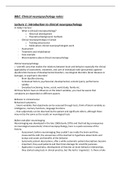College aantekeningen
College aantekeningen B&C 2: Clinical Neuropsychology (SOW-PSB3DH23E) Clinical neuropsychology, ISBN: 9789089537591
- Instelling
- Radboud Universiteit Nijmegen (RU)
College aantekeningen van het vak B&C 2: Clinical Neuropsychology, in het Engels, geschreven in het collegejaar 2021/2022
[Meer zien]






